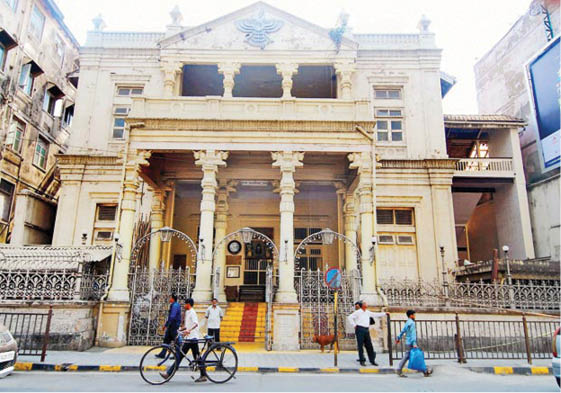MMRCL Moves Bombay High Court For Urgent Hearing On Parsi Community Plea; MMRCL Panel Says Re-Alignment Not Feasible for Atash Behrams
.
On Thursday, 28th June, 2018, the Mumbai Metro Rail Corporation Ltd (MMRCL) approached the Bombay High Court with the aim of seeking an urgent hearing on the plea filed by the Parsi community, opposing the alignment of the Mumbai Metro III project, whose underground tunnelling activity poses a structural and spiritual threat to the sanctity of two of Mumbai’s oldest Atash Behrams – Wadiaji Atash Behram and Anjuman Atash Behram. MMRCL moved the High Court after a computer-generated date had set the next hearing in March 2019 and continued an interim relief in favour of the Zoroastrian petitioners, who challenged Mumbai Metro-III tunnelling under the Atash Behrams, representing the sentiment of the community.

MMRCL informed the bench of Justices comprising A S Oka and R I Chagla that the tunnelling activity and drilling work for the Colaba-Bandra-Seepz route would reach up to the site of two of the Atash Behrams in roughly 25 days (from 28th June, 2018). MMRCL has denied that its underground tunnelling work would cause any of the mentioned damage. The bench, led by Justice Oka, had now scheduled the hearing on the pleas for July 17, this year. It has also granted a week’s time to the MMRCL to file an affidavit to clear its stand on the issue.
However, the very next day, on 29th June, 2018, it has been reported that the Bombay High Court-appointed committee has categorically ruled out the possibility of tunnel realignment for the Mumbai Metro III route to bypass two Atash Behrams at the Princess Street junction. The report says a concept plan to shift the tunnel nine metres away is technically not feasible.
In an attempt to offer some relief to the Parsi community who had moved court against tunnelling under the heritage religious sites, the report says an alternate plan “will reduce the extent of tunnel alignment within Wadiaji Atash Behram and the Anjuman Atash Behram” by over 3 metres. The panel, headed by Ashwini Bhide, MD, MMRC, with senior bureaucrats UPS Madan, Ajoy Mehta and Rahul Asthana, in its report concluded, “The alternative plan of MMRCL for Kalbadevi station would allow shifting of the upper track tunnel by 3.5 metres towards JSS Road from its present location.”
On May 23, a vacation bench headed by Justice S J Kathawalla had passed interim orders after recording a statement of MMRCL that no tunnelling would touch the walls of Atash Behrams till the next date. The Parsi petitioners’ counsel Shyam Mehta with Zerick Dastur and Homiar Vakil, who appeared for trustees of both Atash Behrams, said the statement continues since June 14, 2018. But MMRCL lawyer, Roop Sahu, said the tunnel work would not reach the Atash Behrams for 25 to 30 days and sought a hearing in July. The High Court bench comprising Justices Abhay Oka and Riyaz Chagla continued the relief till July 17, 2018 when the matter will now be heard for admission. The court, on Mehta’s plea, said the trustees and priests who were directed by the earlier order to appear in court, were at liberty to seek exemption. The trustees can file their affidavits by July 11, 2018.
The community has been opposing such tunnelling work alleging that the same might cause severe damage to the temples. Earlier, on 8th June, 2018, a large volume of the community members as well as High Priests and organisations including WAPIZ and the Bombay Parsi Punchayet, had come together to unitedly pledge and support the ‘Save Our Atash Behrams’ Movement and had approached a vacation bench of the High Court opposing the drilling work for two tunnels of the Metro III line.
The petitioners – structural engineer Jamshed Sukhadwalla, senior solicitor Berjis Desai, Zoroastrian scholar and priest, Er. Rooyintan Peer and two trustees of Shah Varzaavand Trust, a public charitable trust – informed the High Court that the MMRCL was making two tunnels near Azad Maidan as part of the work on the Colaba-Bandra-SEEPZ Metro III corridor. As per the present plan of MMRC, these tunnels will pass directly under two fire temples and Atash Behrams (sacred fires), one at the junction of Princess Street, and another at Dhobi Talao in South Mumbai – both heritage sites. The petitioners said the proposed work, in its current form, will lead to desecration of the holy fires, threaten the structural safety of the temple buildings, both of which are heritage structures, and that the wells at the temples might run dry because of the tunnelling work.
- દિકરી એટલે બીજી માં… - 20 April2024
- નાગપુરની બાઈ હીરાબાઈ એમ. મુલાનદરેમહેરનો ઇતિહાસ - 20 April2024
- વિશ્વ ભારતી સંસ્થાન દ્વારા રતિ વાડિયાનુંસન્માન કરવામાં આવ્યું - 20 April2024
